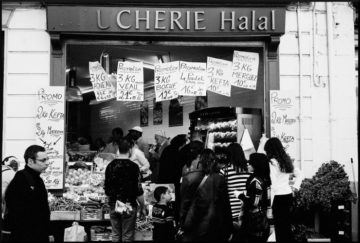John Bowen in Boston Review:
 Last October, while waging the government’s new campaign against Islamic forms of “separatism,” French Interior minister Gérald Darmanin complained on television that he was frequently “shocked” to enter a supermarket and see a shelf of “communalist food” (cuisine communautaire).
Last October, while waging the government’s new campaign against Islamic forms of “separatism,” French Interior minister Gérald Darmanin complained on television that he was frequently “shocked” to enter a supermarket and see a shelf of “communalist food” (cuisine communautaire).
Darmanin later expanded on his remarks, clarifying that he does not deny that people have a right to eat halal and kosher products (the “communalist foods” in question). He does, however, regret that capitalist profit-seekers advertised foods intended only for one segment of society in such a public way, and, even worse, in food shops patronized by all sorts of people. This, he contended, weakened the Republic by encouraging “separatism.” Of course, despite the intentional vagueness of the term “communalist,” few would have thought that the Minister had kosher pizzas in mind. Rather, he was signaling his annoyance at the myriad ways that—after hijabs in schools and on Decathalon jogging outfits—Muslims were again publicly holding back on their commitment to the Republic.
Darmanin’s remarks are but one version of a growing, broadly European complaint that halal food divides citizens, violates norms of animal welfare, and stealthily intrudes Islam into Western society. This complaint, and the measures that have begun to follow, shift depending on the post-colonial and anti-Islamic politics in each country. On this issue, politics is at once local, regional, and global. But why has access to religiously appropriate food assumed such political importance across Europe?
More here.
